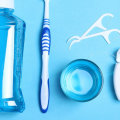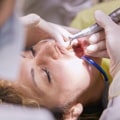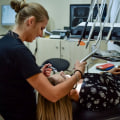Cleaning patients' teeth is an integral part of the dental hygienist's work. Dental hygienists use tools to carefully remove tartar, plaque, and food debris from patients' teeth. They also clean below the gum line to help prevent gum disease. It's important to schedule a dental appointment every 5 to 6 months.
This is the time of year when all the plaque and tartar you have accumulated over time will be professionally removed and your jaw, gums, and teeth will be examined for any signs of disorder or disease. Don't skip this ritual, no matter how hectic your schedule is. While brushing and flossing can defend your oral health at home, it's important to go to the dentist's office every 6 months for a routine cleaning. Our dental hygienists will polish and floss your teeth, as well as administer fluoride rinse.
Routine hygiene visits will give your teeth a thorough cleaning that you can't do yourself at home. By teaching their patients how to better care for their mouth, they effectively act as public health ambassadors. Dental hygienists instruct patients of all ages on how to properly brush and floss, and they also emphasize the importance of doing so. They can discuss the relationship between diet and oral health and make recommendations to help patients select toothbrushes and other oral care devices.
Your oral health is more important than you think. Learn how the health of your mouth, teeth and gums can affect your overall health. We also explain how you can become a dental hygienist, including earning an associate's degree or bachelor's degree in dental hygiene. This license ensures that dental hygienists are trained to administer dentistry to patients, as well as to work as educators, researchers and in the administration. Your oral health is more important than you think. Learn how the health of your mouth, teeth and gums can affect your overall health. We also explain how you can become a dental hygienist, including earning an associate's degree or bachelor's degree in dental hygiene. This license ensures that dental hygienists are trained to administer dentistry to patients, as well as to work as educators, researchers and in the administration.
Legacy Community Health provides dental services for adults and children at its clinics in Montrose, Baker-Ripley, Lyons and San Jacinto. However, dental hygienists can also attend college programs for a bachelor's or master's degree in dental hygiene. Practicing good dental hygiene is very important, because it can prevent these types of oral diseases and dental problems. For example, every time you visit your dentist for a routine cleaning and checkup, a dental hygienist will clean your teeth, remove plaque and tartar, perform a preliminary exam, and perform imaging as needed.
Before the hygienist or dentist performs any dental work, the hygienist must conduct a medical history. Equipped with knowledge of the right techniques, patients are more likely to maintain good dental health. Hygienists receive specialized training to develop dental hygienist skills and are qualified to work with patients. Dental hygienists must complete a training program accredited by the Dental Accreditation Commission.
Hygienists are also responsible for performing dental x-rays, removing plaque, and using preventive treatments such as sealants and fluoride on teeth. Are graduates of accredited dental hygiene education programs at the college or university level. This seal, awarded by the American Dental Association, means that the product has been rigorously tested and approved by scientists in fields such as microbiology, toxicology, pharmacology and chemistry. This is because dental hygienists work closely with patients, making them an essential part of every dental practice.
A dental hygienist's procedures may include removing plaque, scraping, polishing, taking and developing dental x-rays, and applying fluoride. .



